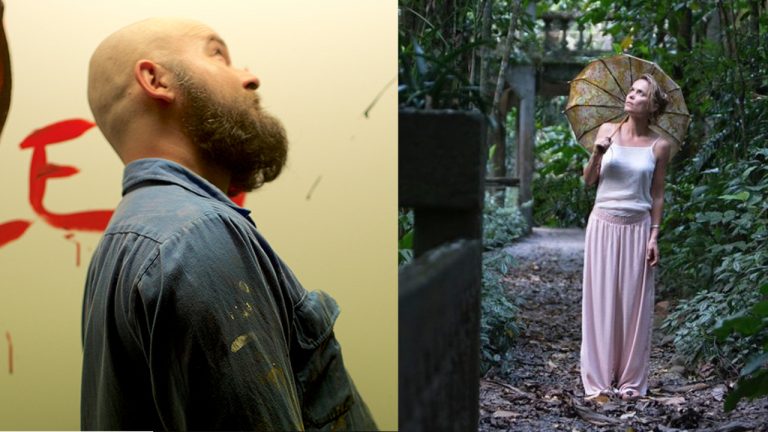Horror is often one of the most preferred genres by first-time filmmakers. It could easily find the necessary backing and its audience. In the last few years, there have been quite a few women directors making their remarkable debut in the horror genre. Julia Ducornau’s Raw, Jennifer Kent’s Babadook, Coralie Fargeat’s Revenge, and Ana Lily Amirpour’s A Girl Walks Home Alone at Night are some of the titles that come to mind. Critics may argue that it’s more than ‘easy access’ when it comes to female debutant directors opting for the horror genre. If horror, in general, is about exploring things that are out of our control – be it psychological, social, sexual, political – then one can muse who else can perfectly convey that particular feeling, mostly intrinsic to the female experience. Whatever the reason behind this recent spate of character-driven women-centric horror, we have one more remarkably assured feature to add to the list: Rose Glass’s Saint Maud (2019).
Saint Maud has a familiar horror premise: the dogma of structured religion sinking its teeth into a vulnerable individual. In fact, Catholic-style body horror involving female central characters isn’t anything new. But Rose Glass stages the psychotic breakdown of her ostracized protagonist with frightening intensity and striking precision. The impact of horror movies that traps us inside the headspace of their disturbed characters can dissipate once we are out of it, i.e., as soon as it finishes. In that way, Saint Maud doesn’t have a lingering effect. However, it is deeply unnerving while it lasts and doubles up as the character study of a woman who belongs nowhere except in the hypothetical ‘Kingdom of God’.
Related to Saint Maud – Yes, God, Yes [2020] Review : Natalia Dyer leads Journey of a Catholic teenager going through her sexual awakening
Saint Maud opens with ominous, mood-establishing imagery that expresses something’s cooking inside Maud (Morfydd Clark), a young nurse working as a palliative private caregiver. The soup Maud puts on the stove is made to resemble the boiling pits of hell. Her emergence from the basement apartment, situated in the cheerless seaside town, to a secluded mansion in the hillock for her new job is a telltale sign of things to follow. After a horrific incident at the hospital, involving Maud – the event is never explicitly stated – she seems to have found God. As a devout Catholic Maud believes in the role God has ordained her. She’s looking for the sign to know what exactly it is.

The experience with her new employer Amanda Kohl (Jennifer Ehle), a middle-aged choreographer suffering from the terminal stages of lymphoma, offers that alleged sign from God. Maud believes she needs to save the soul of the frustrated, boozing, bi-sexual Amanda. Amanda obviously sees through Maud’s religious fervor and has a bit of fun with it. Maud derives orgasmic pleasure from her religious zeal, and at one moment Amanda shares that too. The lonely employer’s attention pushes Maud to take her ‘role’ a little too seriously. Soon, it becomes a relationship of emotional dependence, all the more so for Maud. Not long after, things spiral out of control and Maud having misread the situation crosses a line she shouldn’t have.
Maud once again finds herself back at her basement apartment. If writer/director Rose Glass offered some objective distance earlier, building the bridge between viewers and Maud through somewhat level-headed voice-overs, she now burns that bridge, trapping us inside the increasingly delusional mind of Maud. Faced with indifference and rejections, Maud uses her sexuality to find refuge somewhere. When that too backfires, all the mental self-flagellation facilitates the descent towards madness. The religious bliss and the divinatory purpose are once again reinstated. Now stripped off all the liveliness and cloaked in a robe, Maud makes one last effort for the sake of her faith.
Also Read: 10 Great Foreign Horror Movies You Can Watch Right Now
Directorial touches and editorial choices make Saint Maud a fine exercise in horror, though its storyline seems to move through a predictable path. It’s more unsettling than scary. The film works as the character study of a messed-up person, for whom we really feel for though we keep anticipating the worst. Rose Glass uses stillness to a great effect, often composing the radiating face of Maud amidst the darkness. While in the earlier half Maud remains a beacon of light, she gradually gets lost among the daunting shadows. The psychological tension Glass creates in Maud’s encounter with Amanda is conventional to a point. It is only when Saint Maud stops being a two-person chamber piece and returns to Maud’s basement apartment things get interesting.
It often feels that Glass has written herself to a corner that everything comes across predestined. It may be the result of horror features often channeling psychological realism through the subjects of repressed sexuality and onerous religious dogma. Requiem (2006) and Stations of the Cross (2014) are few of the social-realist movies to question the stringent religious interpretation in a non-horror format. Besides, I didn’t feel that there was any ambiguity at play despite Maud’s encounter with the Welsh-speaking God and English-speaking Devil. However, even though the ambiguity is feigned and the outcome is familiar, Glass keeps finding ways to evoke feelings of discomfort. William Blake’s Great Red Dragon and the Woman Clothed in Sun is used to a great effect, landing a twisted catharsis to Maud’s self-torture. Moreover, the narrative’s effectiveness is greatly bolstered by the brilliant screen presence of Morfydd Clark.
Overall, Saint Maud’s (84 minutes) suffocating atmosphere and scorching intensity make it a gripping psychological horror in spite of its inevitably familiar plot structure.





![The Tunnel [2011] Review: Undone By Its Weak Ending](https://79468c92.delivery.rocketcdn.me/wp-content/uploads/2019/09/the-tunnel-cover-768x432.jpg)
![Anne+: The Film [2022] Netflix Review: An Important but Unfocused Mainstream Queer Drama](https://79468c92.delivery.rocketcdn.me/wp-content/uploads/2022/02/Anne-The-Film-768x401.jpg)

